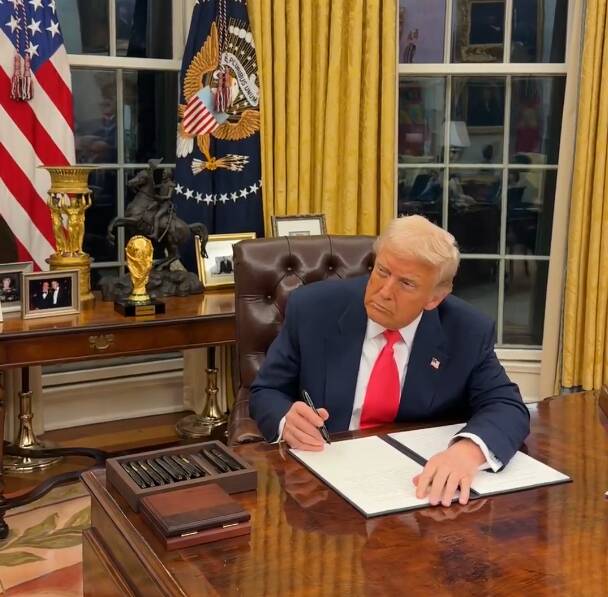Today in the fast-evolving world of cryptocurrency, we witness significant developments on both sides of the globe that could shape the future of digital assets. In Argentina, the country has rolled out new regulations aimed at virtual asset service providers (VASPs), marking a significant step towards a regulated crypto framework. These guidelines, released by the National Securities Commission, focus on transparency, stability, and user protection, ensuring that cryptocurrency exchanges adhere to strict codes of conduct, cybersecurity measures, and rigorous risk disclosures.
Meanwhile, in the United States, the legislative landscape is heating up as Representative Byron Donalds prepares to introduce a bill designed to solidify a Strategic Bitcoin Reserve. This initiative seeks to institutionalize an executive order from former President Donald Trump that proposes using Bitcoin seized in criminal cases to create a national reserve of the digital currency. While this idea aims to embed Bitcoin into the national financial strategy, it faces opposition, with Democratic Representatives urging caution and suggesting that efforts toward establishing such a reserve should be halted.
“For years, the Democrats waged war on crypto,” said Donalds, emphasizing the need for a robust pro-crypto stance in Congress.
A notable figure in the crypto space, David Sacks, has also made headlines after selling over 0 million worth of cryptocurrency and related stocks prior to his appointment as the White House AI and crypto czar. This move is seen as a measure to mitigate potential conflicts of interest as he embarks on forming a legal framework for the industry. Sacks’s actions reflect the increasing scrutiny and regulatory expectations being placed on those in power within the crypto ecosystem.
Taken together, these developments highlight a pivotal moment for the cryptocurrency industry, as countries adapt their regulations and lawmakers seek to define the role of digital assets within their financial systems. Observers will be watching closely to see how these changes unfold and what they mean for the future of cryptocurrency regulation and acceptance.
Key Developments in Crypto Regulation and Strategy
Recent events in the cryptocurrency sector highlight changes in regulations and strategic initiatives that could significantly impact investors and users in the crypto ecosystem.
-
Argentina’s New Regulations for Crypto Firms:
- New regulations finalized by Argentina’s National Securities Commission (CNV) for Virtual Asset Service Providers (VASPs).
- Requirements include registration, cybersecurity measures, asset custody, and prevention of money laundering.
- Goals are to enhance transparency, stability, and user protection in the crypto market.
- Potential impacts:
- Increased investor confidence due to clearer regulatory frameworks.
- Possible restrictions on non-compliant firms, affecting market accessibility.
-
U.S. Bill on Strategic Bitcoin Reserve:
- Representative Byron Donalds to introduce a bill formalizing former President Trump’s executive order to create a U.S. Strategic Bitcoin Reserve.
- Bill aims to prevent future administrations from dismantling the reserve, promoting Bitcoin’s integration into the national financial strategy.
- Potential impacts:
- Could make Bitcoin a stable component of U.S. fiscal policy, reinforcing its legitimacy.
- Promotes a potentially pro-crypto legislative environment following previous regulatory resistance.
-
Potential Conflicts of Interest in U.S. Crypto Leadership:
- David Sacks and Craft Ventures sold over 0 million in crypto assets before assuming a government role as a crypto czar.
- Government memorandum outlines steps taken to mitigate conflicts of interest related to Sacks’s former investments.
- Implication:
- Heightened scrutiny around leadership roles in the crypto sector could affect public trust and policy direction.
Argentina vs. U.S.: The Evolving Landscape of Cryptocurrency Regulation
In recent developments of the cryptocurrency sector, Argentina and the United States have initiated distinct and impactful regulatory actions that not only showcase their unique approaches but also highlight potential competitive advantages and disadvantages within the crypto market. Argentina’s recent regulations targeting virtual asset service providers (VASPs) aim to foster a more secure and orderly framework for digital asset transactions. In contrast, a new U.S. bill could solidify a national Bitcoin reserve stemming from former President Trump’s executive order, pushing the U.S. further into the crypto spotlight.
Comparative Advantages: Argentina is making strides to enhance user protection and transparency in its crypto ecosystem through stringent requirements that enforce cybersecurity protocols and the separation of client and company funds. Such measures can boost investor confidence and encourage local and foreign investments in the country’s crypto market. The establishment of a legal framework could also attract well-regulated VASPs seeking a stable environment, positioning Argentina as a proactive player on the global stage of cryptocurrency regulation.
On the U.S. side, the proposed legislation to formalize a Bitcoin reserve signifies a potential shift in policy that could integrate cryptocurrency more deeply into the nation’s economic fabric. If passed, this could foster increased institutional interest in Bitcoin, possibly leading to greater mainstream acceptance and utilization of cryptocurrencies across various sectors.
Comparative Disadvantages: However, Argentina’s aggressive regulatory stance could inhibit innovation and limit the agility of crypto startups struggling to comply with stringent rules. For newer projects, navigating compliance logistics could be daunting, potentially driving talent and investments to regions with more lenient regulations. Meanwhile, in the U.S., the proposal’s success hinges on bipartisan support, making it susceptible to political divides. If Congressional Republicans do not secure the necessary votes, the initiative may falter, stunting the potential expansion of a Bitcoin reserve and leaving the country vulnerable to swift policy changes under future administrations.
Implications for Stakeholders: Argentina’s rules are likely to benefit investors seeking security and assurance in a regulated market, but they may pose challenges for smaller companies striving to gain a foothold. As for the U.S. proposals, successful codification of a Bitcoin reserve could create significant opportunities for institutional investors. However, should partisan politics derail the legislation, it could leave businesses in a prolonged state of uncertainty and inhibit the overall growth of the crypto sector within the U.S.















